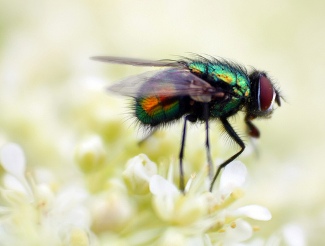Forensic Science
Forensic entomology is the study of insect and other
types of arthropods to criminal investigations.
These creatures can help provide information that
includes the time of death, detection of drugs, and
poisons. In open air a corpse will attract blowflies within ten
minutes after death. These flies will begin to lay
their eggs in the eyes, mouth, and nose of the body. When the eggs
hatch, maggots will begin to feed on the body tissue.
This usually happens within twelve hours after
death. After about a day, beetles will be attracted
to the body and eat the dry flesh. Two days later,
the corpse will attract spiders, mites, and
millipedes to eat the bugs that are already on the
corpse.
open air a corpse will attract blowflies within ten
minutes after death. These flies will begin to lay
their eggs in the eyes, mouth, and nose of the body. When the eggs
hatch, maggots will begin to feed on the body tissue.
This usually happens within twelve hours after
death. After about a day, beetles will be attracted
to the body and eat the dry flesh. Two days later,
the corpse will attract spiders, mites, and
millipedes to eat the bugs that are already on the
corpse.
In order to determine the time of
death, entomologists will look at the stage of
development of the Lucilia sericata.
The lifecycle of this blowfly is very predictable
 and
each stage of development usually will last the same
amount of time. Scientists have to keep in mind that
warmer weather will increase the growth of
Lucilia sericata. They will examine the
temperature, the developmental stage, and calculate
how long the body has been dead. To determine if the
person has been poisoned, evidence will be
discovered in the maggot’s stomach. The Body Farm
Research Lab, at the University of Tennessee, was
created so that forensic experts can study real
human bodies as they decay. Take a look of this Youtube video about the
body farm!
and
each stage of development usually will last the same
amount of time. Scientists have to keep in mind that
warmer weather will increase the growth of
Lucilia sericata. They will examine the
temperature, the developmental stage, and calculate
how long the body has been dead. To determine if the
person has been poisoned, evidence will be
discovered in the maggot’s stomach. The Body Farm
Research Lab, at the University of Tennessee, was
created so that forensic experts can study real
human bodies as they decay. Take a look of this Youtube video about the
body farm!
Go back to the home page